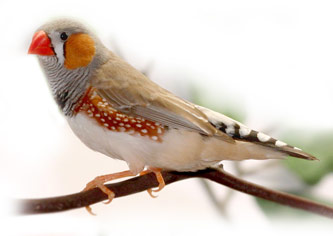
The zebra finch is a rare bird in that its full genome has been mapped by geneticists. Remarkably, this has led to advances in stuttering research. The findings revealed that a substantial part of the genome of the finch is for the purpose of hearing and singing bird songs. This made the bird a candidate for further study, as its song “language” is remarkably similar to human language in certain respects.
The complexity of a bird’s song is extraordinary. Baby songbirds learn their songs from their fathers, much in the same way a human baby learn language from its parents.
This phenomenon of “learned vocalization” is very rare. Elephants, whales, bats and songbirds are the only known species, other than humans, to do so. The ability indicates that these creatures have specialized areas of their brain devoted to vocal language as communication. This unique characteristic is lacking in many highly intelligent animals, such as great apes.
Elephants and whales are, of course, impractical to study in a lab, and bats are dangerous to handle – so the cute little zebra finch, a colourful bird native to Australia, was chosen for further experimentation.
There is still a lot about language acquisition that scientists don’t know. They do know that the part of the brain that understand words is totally different from the area that produces words. This explains why a chimpanzee can learn to understand some simple human words, but is incapable of speaking them. A dog’s bark is not a language, as the sound is produced instictively, and does not involve a specialized department of the brain.
To study the bird songs further, special adaptation was made to an MRI machine so that the tiny bird could be given a brain scan while it heard another bird singing its “language”. It was discovered that pronounced activity occurred on the right side of the bird’s brain.
Dr. Santosh Helekar, of the Baylor College of Medicine, has studied the song language of the finch as it relates to speech disorders. He made a remarkable discovery that some songbirds have difficulty singing – instead of the melodic sounds of a regular soundbird, these birds get stuck on one repetitive sound. When their brain scans are analyzed, it is found that the brain activity is very similar to a PWS’s brain activity when he/she is stuttering. The bird, too, is stuttering. These birds also showed less activity in the area of the brain used to process sound.
For stuttering research, and for other communication disorders, this could prove important in the study of the genetic basis of the problem, and further advance our knowledge and approach towards treatment.
BIBLIOGRAPHY
Australian Geographic
Nature, International weekly journal of science
Medical news today
Bird Song Study Gives Clues To Human Stuttering
13 Jun 2007 - 1:00 PDT
Nova Science Now
video Aired on PBS July 16, 2008
NPR
Songbird DNA May Offer Clues To Human Speech, by Jon Hamilton April 1, 2010
Science
1 November 2002: Vol. 298. no. 5595, p. 959